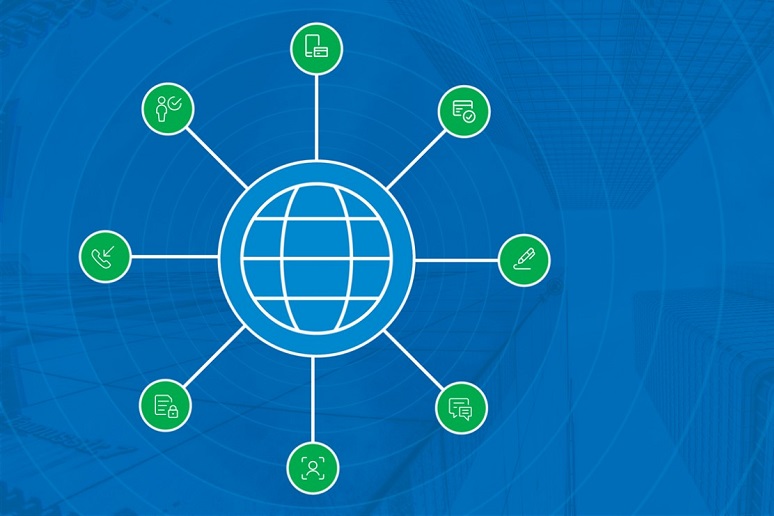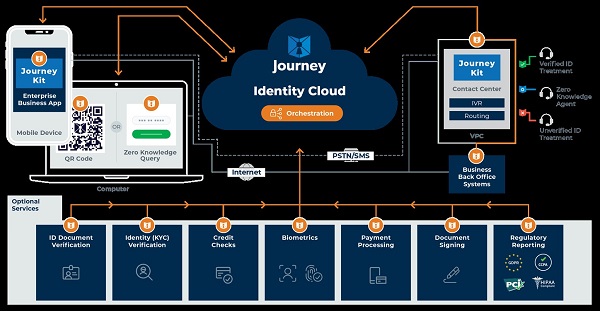Customer experience (CX) startup
Journey officially came out of stealth mode today with the launch of its innovative cloud identity service, which has a prime use case for contact center interactions.
Though making its formal debut today during an
Enterprise Connect Virtual Bootcamp session, Journey has previously earned recognition for its innovative approach for building trusted digital relationships between businesses and their customers. Using a technology known as zero knowledge protocol, Journey’s cloud identity service ensures that no private customer data is shared with contact center agents. For this, Journey won two top honors in the 2020 Best of Enterprise Connect Award program: Best of Enterprise Connect Overall and Best Innovation in Customer Experience,
as revealed in March.
In this article, I’ll review the people behind Journey, what the company does, and why its technology resonates with me.
The Force Behind Journey
Many industry watchers will remember Brett Shockley, a longtime influencer and thought leader in the contact center business. Brett was cofounder and CEO of
Spanlink, and he spent several years at
Cisco as the VP/GM of the Contact Center Business Unit where he launched Cisco’s first VoIP contact center offer. He then co-founded
Calabrio, a workforce optimization software and services company. Brett joined
Avaya in 2008 as managing director of Avaya’s Unified Communications and Contact Center business; he was promoted to several executive positions, finally serving as SVP of corporate strategy and corporate development, as well as CTO.
Following his tenure at Avaya, Brett teamed up with his son, Alex Shockley, who sold his digital marketing agency to co-found Journey with his father. Brett serves as CEO, and Alex is the company president.
Initially, Journey focused on the customer journey, leveraging analytics and artificial intelligence for personalizing and humanizing the customer experience. About two years ago, Journey pivoted, transforming itself into a communications security company focused on identity. Journey believes that verified identity is the foundation of customer experience and of security — both for the customer and for the enterprise.
From his long experience building and marketing contact center solutions, Shockley knew that secure customer interactions are important, yet personal authentication with contact center agents has been primitive and kind of broken. To do it right requires expertise across different domains of security, privacy, and the contact center. Journey began investigating how to maintain security and privacy for individual interactions while providing frictionless tools for businesses that would allow people to authenticate with their systems in ways that did not expose private information to contact center agents. It is from these efforts in developing a “zero knowledge identity network” solution that Journey submitted its compelling entry for the Best of Enterprise Connect Award.
Brett and Alex are joined by Andy Miller, a board member who is the former CEO of Tandberg and Polycom; industry technology veteran Michael Frendo, who serves as CTO; and former Cisco exec Mark Bakies, who runs product management. The company presently has 34 employees, 27 of whom are engineers. It has filed 13 patent applications around its zero knowledge network, with more filings pending.
Zero Knowledge Verification
Journey provides a zero knowledge verification solution, based on a mathematical technique in cryptography known as
zero knowledge proof. A zero knowledge proof is a technique in which one party can prove that they have or know something, such as a password, bank account number, or a Social Security number (SSN), to another party without revealing the password, account number, or SSN itself. Verification is achieved when the person wishing to prove their identity can successfully respond to challenges by the person verifying the identity with enough probability to convince the verifier that the prover actually does possess the claimed knowledge.
To simplify, the key idea is: Can you verify who you say you are to someone else without giving them personally identifying information? In the contact center scenario, this means that a customer can be authenticated to the agent, sharing and verifying a wide array of subsequent attributes, without the agent ever seeing, typing, or having access to their private personal information.
Zero knowledge verification is the problem Journey is addressing… and solving for contact centers. The solution has four critical elements:
- It securely collections information.
- It encrypts that information.
- It orchestrates transmission of that encrypted information to one or more entities that can verify the collected information is valid and accurate in the format specified by the verifying entity.
- Once verified, both the user and the agent receive a signed digital certificate guaranteeing that the information is verified.
To accomplish these tasks, Journey has created what it calls the Journey Zero Knowledge Network, as illustrated in the figure below.
At the heart of the solution is Journey’s Identity Orchestration Cloud. This cloud facilitates the transfer of encrypted identifying information between the various parties in a transaction, including:
- The end user
- The back-office systems an organization uses to provide a product or service. This will include transfer of information such as CRM records, health records, bank account information, names, addresses, and SSNs. Such data is often stored in data lakes owned by the product or service provider. Data about the user has been obtained from application forms, service agreements, and other documents or data the user has provided in order to purchase or access the product or service
- Third parties that can provide enhanced authentication and verification services as part of a transaction. Examples include merchant services companies that enable credit card transactions, companies that provide cloud-based biometric verification services, and governmental organizations that may be looking for terrorists or money launders
- The contact center agents and systems, including dialers, IVR, CTI, and ACD
For end users, many organizations offer mobile apps that can use facial or fingerprint recognition or other biometric capabilities for authentication. Journey provides an SDK that mobile app developers can use to allow their apps to communicate with the organization’s back-end systems and/or to partner companies in a secure and encrypted fashion.
For example, users can authenticate with a contact center agent using facial recognition on their phone. Once authenticated, the verification status is sent to the agent’s dashboard — driving the veracity of identification to one in a billion or greater and eliminating the need for silly “security” or challenge questions. When contrasted to the industry benchmark of 45-90 seconds for knowledge-based authentication (the challenge questions), or voice-biometric authentication that can reach only around 95% accuracy, achieving such high verification accuracy in one or two seconds while simultaneously protecting the agent environment and the user’s private information is a big deal.
Click to Page 2 to see how Journey's zero knowledge verification would work for an inbound call to a bank contact center











